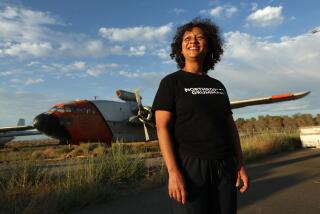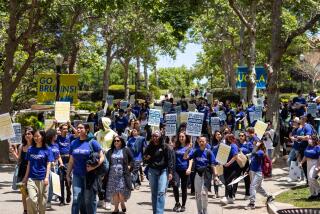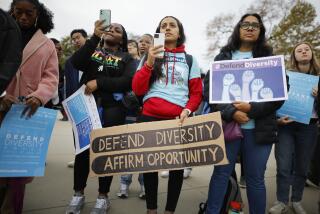Making Hay With Education
- Share via
DEEP SPRINGS, Calif. — There is no ivy here in the high desert between California’s White Mountains and the Nevada border, but among the cows and scrub lies one of the most selective colleges in the nation.
Deep Springs College, a two-year liberal arts school, has just 26 students -- all male -- and occupies a 120-square-mile cattle ranch.
It has none of the plush facilities now common at colleges: no opulent student center, no espresso bar, no fitness center. Many in higher education have never heard of the place. Yet it draws some of the best minds in the country. Only 10% of applicants are admitted, and the combined SAT scores of enrollees average about 1500, putting them in a league with students admitted to Harvard and Caltech.
Instead of competing with other schools to offer more amenities, Deep Springs promises hard work.
Students rise before dawn to bale hay or milk cows, then head for class to discuss Emily Dickinson with dung stuck to their boots. In exchange for working at least 20 hours a week, they pay no tuition and receive free room and board.
Students also take the lead in hiring professors, setting the curriculum and choosing the incoming class. So in the afternoon, some mend fences, scrub toilets or butcher meat for dinner, while others discuss whether next semester’s course offerings should include thermodynamics or Proust and criticism, or both.
The arduous labor in the classroom and fields pays off when the time comes to transfer to a four-year school. Last year’s graduates went on to Brown, Columbia, Cornell, Harvard, Oxford and Stanford.
Each such success affirms the vision of the college’s founder, a feisty Ohioan who believed that a combination of physical toil, book learning and monastic isolation would forge outstanding citizens.
Max Gasner, 19, a graduate of Stuyvesant High School in New York City, a highly selective public school, chose Deep Springs over Yale. He saw many of his peers caught up in moving from one prestigious school to the next, rather than focusing on learning.
“A lot of people who go to college don’t really want to go to college, but do it because it’s expected of them,” he said. At Deep Springs, “for the most part, people are here because they really want to do what we do.”
The only required courses are composition and public speaking. This year’s elective offerings include philosophy and literature of love, geology of Eastern California, 20th century American theater and planetary science. The average class size is four students.
“You won’t go to class and find half the people haven’t done their reading,” said Tony Sung, who graduated from Deep Springs last year and is now a premed student at Stanford. “You, the other students and the professor have decided the goals for the class, and you are needed to help accomplish those goals.”
Deep Springs President L. Jackson Newell, who attended the college 47 years ago, likens it to medieval Italian universities in Bologna and Padua, where students hired scholars to teach them and required their favorites to seek permission before marrying and to post a bond before leaving town.
Deep Springs isn’t quite so extreme, but “students once again are at the center of things,” Newell said.
Remote Location
Hard to get into, Deep Springs is also hard to get to.
It’s a five-hour drive from Los Angeles. The closest you can get by commercial airline is Las Vegas, 235 miles to the southeast. From there, it’s a three-hour ride on a once-a-day Greyhound to the stop nearest the college, outside a brothel.
A college van takes students the rest of the way -- an hourlong drive over a 6,400-foot-high mountain pass into the Deep Springs Valley.
“A number of times, people have forgotten to pick me up,” said Johan Ugander, 19, a second-year student from Woodcliff Lake, N.J. On such occasions, he used the brothel phone to call the college for a ride.
In the desolate valley, the college appears as an oasis of cottonwood trees, barley and alfalfa fields, and horse and cattle corrals.
Lucien Lucius Nunn, a lawyer, banker, gold-mine operator and pioneer in the electric power industry, founded Deep Springs in 1917 as a refuge from what he considered the distractions of traditional campus life: women, organized athletics, bars and money.
Nunn, an Ohio native, settled in Telluride, Colo., and amassed a fortune building power plants for mines. Nunn also was president of a Telluride bank, a job that set the scene for an often-repeated tale in Nunn’s personal legend.
According to a Nunn biography by Robert Aird, a Deep Springs alumnus and Nunn family friend, the bank was robbed by Butch Cassidy’s gang. Nunn, who stood 4 inches shorter than his idol, Napoleon, hopped on his horse to charge after the robbers. On a mountain trail, the Wild Bunch quickly took Nunn’s horse and gun and left him stranded.
The same kind of brashness led Nunn to build a college in the middle of nowhere, with an enrollment of a few dozen students, and expect it to change the world. Nunn had earlier started a college in Claremont, Va., but disbanded it after a year when students spent too much time socializing in town.
He soon learned of a ranch for sale in the Deep Springs Valley and decided after a visit that it would be ideal for his purposes. The school was set up as a two-year institution because Nunn hoped students would transfer to Cornell University in Ithaca, N.Y., where he had already established a residential college.
Nunn founded Deep Springs based on “three pillars”: labor, academics and self-government. He wanted students to develop an instinctive understanding of democratic principles and the need to serve society.
Labor and self-government, he believed, would make students responsible for the quality of their lives. If they wanted clean toilets, they would clean them; to get along in their isolation, they would have to communicate and cooperate. Academic work would build their capacity to reflect on their lives at Deep Springs and their responsibility to the world beyond.
Nunn saw the school’s purpose as emphasizing “unselfish service in uplifting mankind from materialism to idealism.” In 1923, he asked students: “For what came ye into the wilderness? Not for conventional scholastic training; not for ranch life; not to become proficient in commercial or professional pursuits for personal gain. You came to prepare for a life of service.”
He oversaw construction of the campus -- a dozen long, single-story buildings with broad eaves in the Prairie style inspired by Frank Lloyd Wright. He also set the school’s basic ground rules: no unnecessary trips to town and no mind-altering substances. The rules were to be enforced by the students themselves.
Today, students do not leave campus without permission, and alcohol is prohibited. Television isn’t explicitly banned, but there’s no reception. Phone service and Internet connections break up in bad weather and newspapers come by mail, two days late.
The school’s annual budget of $1.1 million does not match the annual pay of individual superstar professors at big schools, and the college’s $10-million endowment is less than the annual budget of many Division I football programs.
The school generates applicants by word of mouth and through a mailing to the top 14,000 male scorers on the SAT. Students and college officials say they rely on the mailing because the college has no admissions staff and only a small recruiting budget.
Test scores are actually less important, they say, than an applicant’s commitment to Deep Springs’ philosophy. Finalists for admission must prove their dedication in a three-day tryout involving ranch work and classes.
Diversity is the first casualty of the system’s heavy reliance on the SAT-based mailing. All but a few of the current students attended either prestigious prep schools or top public high schools.
“We perceive it as a problem: Our applicant pool is overwhelmingly white and upper middle class,” said Gary Gossen, the college’s dean and a professor of anthropology.
Three black students have attended Deep Springs in the school’s history, Newell said. The current student body is all white except for one Asian American.
The college’s nine faculty members are a mix of one-year appointments and “long-term” professors who stay up to six years. Many are recently out of doctoral programs or retired. Distinguished figures from outside academia also are recruited. This year, acclaimed theater director Louis Fantasia will join the faculty. In November, author Philip Gourevitch spent two weeks at Deep Springs teaching writing.
Faculty salaries are low -- from $28,000 to $45,000 -- but the teaching is deeply satisfying, said Gossen, who went to Deep Springs after retiring early as an anthropology professor at the State University of New York in Albany.
“I have occasionally stood in front of 300 students feeling I was just a talking head at the lectern, and what I said or did made no difference in people’s lives,” he said. In contrast, Deep Springs students “are so responsive, so able, so willing to do their part, I always feel as a teacher I can accomplish something.”
Founding Principles
Everyone at Deep Springs, it seems, has read Nunn’s ideas on education, and students still invoke his writings.
Belief in the “Nunnian principles” gets Nick Tsang and Derek Spitz out of bed every morning. By 5 a.m., the “dairy boys” are in the barn tugging on Holsteins Ruth and Lillith, as the electric guitars of the pop group Fountains of Wayne blare over the sound of milk splashing into steel pails.
“It’s our responsibility to provide the community with milk. If we don’t do this, we don’t have milk,” said Spitz, a first-year student from Salinas, Calif.
If there’s one area in which students often are at odds with Nunn’s legacy, it is coeducation. Students this year voted to support admitting women, and the board of trustees is looking into the idea.
Those who want Deep Springs to remain all male think romantic involvements with fellow students would be a distraction. Students who favor admitting women point out that the distraction, if it is one, is already there: Sexual relationships between male students have long been a fact of life at the school.
The rainbow-colored gay pride flag occasionally flies over the main building, and many students believe Nunn was gay. Aird’s biography calls it an open question.
Newell said he does not think Deep Springs has a higher percentage of gay students than other schools. He sees the college as “a place where people feel comfortable being themselves.”
In an all-male environment, that comfort level sometimes leads to exaggerated boyishness. Students compete to see who can go longest without showering. Student body meetings sometimes conclude with wrestling matches. Only a couple of students seem to own a comb, and many dress from a communal clothes pile in the dorm hallway.
At the same time, they are willfully anti-macho -- knitting has been a popular hobby and a student’s chard tart won a prize at last year’s county fair.
Signs of Respect
Though unknown to many academics and college administrators, Deep Springs is deeply respected by admissions directors at top schools
Deep Springs students are “in almost every case qualified, and often super-qualified” to transfer to the University of Chicago, said Ted O’Neill, dean of admissions there.
William R. Fitzsimmons, dean of admissions at Harvard, said he was familiar with Deep Springs for two reasons: Some students turn down his school to go there, and they are often admitted to Harvard once they graduate.
“They come in [to Deep Springs] bright, thoughtful and interesting people,” Fitzsimmons said. “They emerge even more thoughtful, even more interesting. It’s the kind of thing we seek to create here.”
Deep Springs has turned out fewer students in its history -- about 1,000 -- than Harvard graduates in a single year. But there’s no doubt Deep Springs graduates are an accomplished bunch. Most go on to obtain a doctorate or a medical or law degree, according to a survey of graduates. Alumni have served in Congress and as U.S. ambassadors.
Many say their Deep Springs experience taught them to take risks to do the right thing. One graduate, Thomas E. Fairchild, ran against U.S. Sen. Joseph McCarthy in 1952. He told Aird that he was “impelled by a Deep Springs-type of conscience” to stop McCarthy’s “witch hunt” for communists. Fairchild, who narrowly lost the election, later served on the Wisconsin Supreme Court and now, in his 90s, is a senior judge on the 7th Circuit U.S. Court of Appeals.
The college’s survival itself reminds students that risk-taking can pay off.
A T-shirt sold on campus sums up the accomplishment. Featuring photographs of Lenin and Nunn, it proclaims: “In 1917, two radical social utopias were born.... only one survives.”
More to Read
Sign up for Essential California
The most important California stories and recommendations in your inbox every morning.
You may occasionally receive promotional content from the Los Angeles Times.













